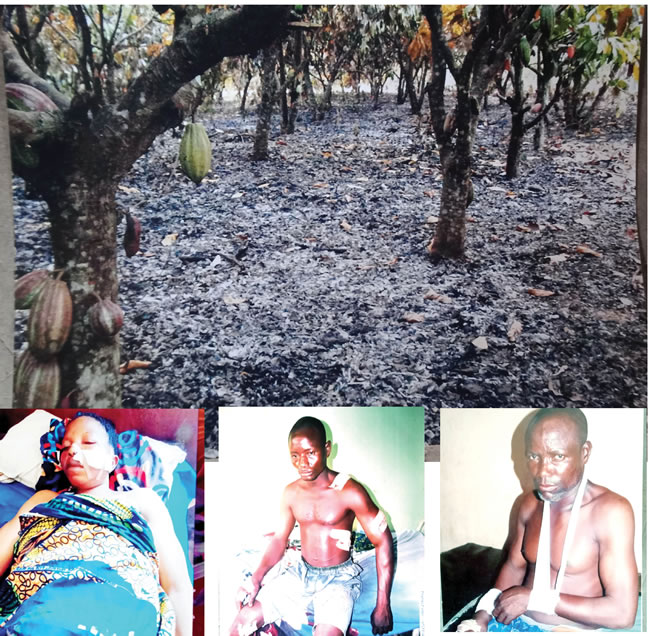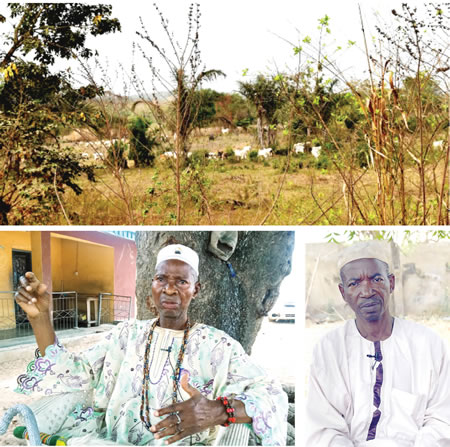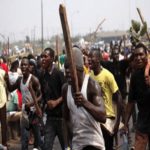Lush vegetation, vast landscape, quiet ambience are the qualities that merge to give Igangan, Ayete and Igboora the beautiful greenery that is a delight of herdsmen. However, following constant clashes between farmers and herdsmen, sometimes resulting in gruesome murders, the most recent being the killing of Dr. Fatai Aborode in Ibarapa North Local Government Area of Oyo State, there have been heightened calls that herders in the region should vacate the territory. KEHINDE OYETIMI and NURUDEEN ALIMI, after a visit to these communities, report the saddening events that have become the norm.
“Please do not talk to my father. He is yet to come to terms with the death of his son. It is a most tragic experience. How does one quantify the loss of a dear brother? My brother was killed like an animal by two herdsmen. His offence was that he asked them to drive their cows off his already cultivated farmland,” Bisi Olaosepin, whose brother was hacked to death, struggled to hold back his tears as he relayed to Sunday Tribune the horrible experience that culminated in the passage of his brother.
The gruesome murder of 27-year-old Samson Olaosepin who, like his father, knew no other life except farming, was regarded by residents of Ayete and Igangan in Ibarapa North Local Government Area of Oyo State, as one death too many. Samson’s murder was in 2017. Yet, rather than abate, the reported cases of killings, rape and kidnapping in the area heightened.
Bisi pointed, with shaky fingers, at the patch of farmland where Samson met his death. “I was not around when the deed was carried out but the gory sight of my brother made my heart sink. We are farmers and we have been in this for many years. My siblings and I would always come to help my father in the farm. This is Igangan and farming is our life. The large expanse of land that you find here and the rich soil has attracted herdsmen and other farmers who are not indigenes of this place. Despite the crude farming tools that we employ here, the harvest is usually rich considering the fertility of the soil.
“But I must quickly add that these herdsmen both Fulani and Bororo—that is how we refer to them — have been with us for many years. I grew up to know them. It is usually a common sight to find them herding their cattle on the large expanse of vegetative land. I grew up knowing the challenge that farmers here are faced with when it comes to clashes between the herdsmen and farmers. Their cows eat up our crops and when we resist, lives are lost,” he said.
While Samson’s death, among many other reported tragedies in the area, remains fresh in communal memory, the murder of Dr. Fatai Aborode on December 11, 2020, by suspected herders was the straw that broke the camel’s back. He was reportedly attacked by suspected herdsmen, macheted severally and died between Tapa and Ayete communities on his way to a hospital in Igboora.
Leaving an aged father, children and an extended family, Aborode’s death marked the tipping point.
While trying hard to hold back tears, the 79-year-old father to the late Dr. Fatai Aborode, Alhaji Lasisi Aborode, told Sunday Tribune in his residence at Igangan, that the day he received the news of his son’s death was the gloomiest in his life.
‘We once lived happily together with Fulani herders’
Alhaji Aborode told Sunday Tribune that while growing up, herders and residents of Ibarapa lived harmoniously. “From my childhood, our fathers were friends with Fulani herdsmen. Our fathers even bought cows from them. My forebears were blacksmiths. The Fulani were also farmers. They bought farming implements from my people. We were all friendly. As Muslims, we celebrated festivities together. In fact, they would attend our parties and we also did with them. We had no issues with them. This was my experience when I was a child. This was around 1949.
“Even 40 years back, some Fulani called Baru came around. They would visit us and trade with us. They had large grazing herds. They didn’t graze on our farmlands. They never molested our wives, daughters and mothers. They were wonderful to our farmers,” he said.
Yet he informed that “later, some of them came who are called Bororo. They are wicked and mean. They killed people without any remorse. They are herders. We became disturbed. They would move their cattle into our farmlands and destroy all the crops. Whenever they were confronted, they would brandish their swords and guns and threaten whoever tried to stop their illegality. They wounded many people, killed others and also kidnapped others. They didn’t stop there; they also rapped our women. Whenever they came across our women in the farms, they would take turns in raping them. Many women have died as a result of this. They rape both old and young women.
“My son had a very large farm. He was a mechanised farmer. He was very generous. Whenever he wanted to harvest his farms, he would employ them to help in harvesting his farm. He would give them money. He was good to them. He was not into cattle business.
On that day, he went to visit his farmers who were harvesting his soya farm. He had many workers and two managers. It was December 11, 2020. I was not at home; I had gone to Igboora. I was called on the phone that a terrible thing had happened.”
Vegetation like no other
Bisi’s apt description of the vast vegetative landscape that Igangan, Ayete, and Igboora are known for is without doubt. From Ibadan, through Eleyele to Eruwa, as one approaches Igboora, the spread of the landscape provides a ready-grazing meal for cows and an enticing delight for every herdsman. Intermittently, a sight of herdsmen in company of their cattle comes into view. The lush, green scenery and the quiet ambiance give Igboora, Ayete and Igangan a pastoral uniqueness desirous by any herder.
With its headquarters in Ayete, the Local Government Area has other notable towns like Tapa and Igangan. Also, these towns have a number of villages that make them up. Alaagba, Obada, Konko, Oja-Isale and Ajise are some of the popular markets in the local government area. Despite the differences in topographical spread—Ayete’s hilly contours, Igangan’s vegetative spread—the two towns, including Igboora, have a nomadic presence of herdsmen through many decades.
These unique qualities, as Sunday Tribune would gather, have formed the reasons behind the attraction for herdsmen both within and from “neighbouring countries. My father told me as well as other elderly farmers that because of rich natural landscape, for many years even herdsmen find their way from neighbouring countries here. Unfortunately, while these herdsmen find ready foliage for their cattle, they have been threatening our lives. When we plant crops, we are usually sure of a good harvest. These herdsmen allow their cattle wander on our farmlands thereby causing irreparable loss for us. They come and go. Usually attempts to get them apprehended can be difficult and even when we try to make them pay, they usually resort to violence.”
Following the death of Dr. Fatai Aborode, Yoruba activist, Sunday Adeyemo, popularly called Sunday Igboho, commenced an anti-herders crusade in the region, insisting that Fulani herders left. The backlash that this generated also brought the residents and farmers to the spotlight. In different reactions, residents narrated the sordid experiences they endured at the hands of herdsmen despite government’s promise to provide security.
‘How they destroyed 28 acres of corn, cassava farmlands’
Leader of the farmers’ association in Ibarapa, Daniel Sunday Orisabukola, said the activities of the herdsmen are hideous, insisting that they left. According to him, “They come in lorry loads from the North to our place here in Ibarapa. The moment they get here, they start building makeshift houses. When we confront them, they tell us that they are Nigerians and that nothing can be done to push them away. We tell them that it is impossible to settle on people’s farmlands. They do not listen. After this, they start grazing their cattle.
“They began to feed their cattle on our farmlands. We felt disturbed and fore called on the government. The government told us that it was impossible to ask them to leave, seeing that it was unconstitutional. We felt very threatened and therefore decided to save our lives and livelihoods.
“When we saw them on our farmlands grazing their cows, we initially approached them. They responded by inflicting matchete cuts on us. Many of our farmers ran for their lives. They killed many people who confronted them when grazing their cattle on our farms.
In 2011, one of us had 10 acres of cassava farm. The cassava was ready for harvest. On the day that he was about to harvest, he got there and met nothing on those ten acres. The cows had eaten everything.
“Another farmer among us planted 18 acres of corn. A short while to harvest, this farmer got to his farm and almost died of shock following what he saw. The herders took their cattle there and finished all that this farmer planted. They consumed 18 acres of corn farm. Since 2015, it has been impossible to feel safe here in Igboora and the larger Ibarapa because of the activities of these Fulani and Bororo herdsmen. They started kidnapping our people and collecting ransom; our women became rape victims; they have killed many of us; many others have been maimed. We can’t farm.
“Sadly, these herders also cultivate farmlands here in our domain. It will amaze you to know that while these Fulani and Bororo herders convert our farmlands to grazing planes; their own cultivated farmlands are not affected. Where is that done? We are tired; they should leave our land. After Sunday Igboho visited this place and asked them to leave, many of them left but since the governor came here, they have started returning. They should leave permanently.”
‘I almost lost my life when they attacked me’
48-year-old Salau Wasiu almost died after he was hacked while protesting the destruction of his farm. “Two Bororo herders had taken their cattle to my ofada rice farm measuring one acre. The cows ate the whole acre. They also ate two acres of my corn farm. I was angry and therefore asked them never to do that. They attacked me and wounded me. I fought back and also wounded them. In retaliation, these herders also took their cows and finished another two acres of my cassava farm. These herders have raped our women, killed our people and left many maimed. They should leave our lands. We are suffering. Our government appears handicapped. That is it,” he said.
‘We can’t service the loans we borrowed’
Ronke Adebisi, 60, narrated the financial incapacitation forced on them following their inability to pay back credit facilities gotten from banks. According to her, “I am a trader and a farmer. I have been in this business for 40 years. Sadly, our lives are under threat. On many occasions, my farm got destroyed by cows. When I challenged some of the herders, they brandished swords and I ran for my life. Today, we cannot visit our farmlands. We have no other business that we engage in here. We are farmers. Many of us have been wounded. They neither pity the old nor young.
“Last year, we visited one of the banks where our farmers’ association was given loan. This loan was shared among members and we invested all of it on our farms. As we speak, all the farm lands have been destroyed by the herdsmen and their cows. We have nothing to fall back on. We planted tomatoes, cassava, yam, and others. All have been destroyed. I am ill. My blood pressure has spiked. What do we do? What do we tell the bank? We cannot continue to live like this!”
Arinola Semiu, another farmer, lamented that despite the state governor’s visit, the herders have started returning to cause further harm.
“We accommodated them for many years. But things took a painful twist when we began to lose many acres of our farmlands. We planted but on many instances, their cows would eat up everything. We confronted them but they told us repeatedly that there was nothing that we could do. They attacked our people, robbed us, many were kidnapped and huge ransom paid. We have reported them to the police and other relevant authorities but we got no respite.
“We were very happy when Sunday Igboho came here. We got respite but after the visit of the governor and the invitation by the commissioner of police, the herders have started coming back,” he said.
Mrs Kolawole Rukayat, a resident farmer in Igangan, related the tragic dilemma of women in the area. According to her, “We cannot live with this Fulani and Bororo herders anymore. Women have been raped on their farms. Some were killed; many have been wounded. Our farmlands are no longer safe. We are discouraged as women. What do we do? We cannot continue like this. Let them leave. Let them leave Ibarapa. When they kidnap our people, they request for millions of naira. Our security agents are not doing enough. Many of them have been compromised. This is wrong. We are jobless and handicapped.”
‘With no industries in Ibarapa, we can only farm’
Apostle C.K. Adeseun told Sunday Tribune that with no industries in Ibarapa, who would the residents do aside farming?
“Our lives are in danger. Things were as bad as they are now. When we plant our crops, they destroy them. Our women are not safe. They kidnap our people after which they demand for ransom. I was bedridden for seven years. After my recovery, I started farming but they destroyed everything. There is no peace in our land. We don’t want them any longer. They should leave.
“We have no industries in Ibarapa, and so we took to farmer both at small and large scale. This is how we fend for ourselves. Then how then do you expect us to keep quiet and watch this people destroy us completely and do nothing?” He asked.
Olabode Tope appeared not impressed by the government’s stance on the issue. “I was at the meeting the governor had with some stakeholders recently. I must confess to you that the government does not place value on the security of lives and property. We have lost confidence in the police in Ibarapa Central and Ibarapa North local government areas. They collect up to N4 million and even N7 million from people after kidnapping them.
Odusola Moses, an Igangan resident alleged complicity of politicians. According to him, “There is nothing good coming out of our relationship with the Fulani people. They have never been friendly. On many instances, they destroy our farmlands by grazing their cattle. Whenever we complain, they tell us that they have people in authority in Abuja and that there is nothing that we can do about it. We have abandoned our farmlands because of fear. Many have sustained injuries from deep cuts after they were attacked by these herders; many have lost relatives who were killed. It is very sad.”
Samson Ojebisi, another resident was absolute when he told Sunday Tribune that the only lasting solution to this problem “is for this people to go. They should excuse us; let them return to their base, we can live peacefully without them. The government should help us in this regard, we cannot continue to live in fear of these Fulanis and Bororo terrorising us day and night.”
Oke Adam narrated the painful demise of his brother after he was attacked by herders. “My late brother, Wasiu Fasasi, was hacked to death by these Bororo on his farm. They took his corpse away for three days, we later found him somewhere with his motorcycle placed beside him. Even after the visit of Sunday Igboho, these Fulani herdsmen still perpetrated their evil act. Just four days ago, I was taken to a cassava farm where they had unleashed their cows to feed. Aside that, they set ablaze a cocoa farm of over an acre. We went to their base but they have left the place. This development has caused many farmers to abandon their farms and you know this is a threat to food security in our immediate community, Oyo State and Nigeria as a whole,” he said.
Farmers are scared of visiting their farms —Oba Adeoye, Asigangan of Igangan
In an interaction with Sunday Tribune, the traditional ruler of Igangan, the Asigangan of Igangan, Oba Lasisi Adeoye took a historical dimension into the crisis. According to him, “Fulani and Bororo herdsmen are not the only non-indigenes in this place. We have others like the Igbo people; we have Hausas and people from many parts of the country. For many years, our interaction was cordial. The issue between the herdsmen and farmers stems from the fact that they are all involved with land. The truth is that as Nigerians, we are all entitled to live in any part of the country. The herdsmen deal with cows and these cows graze. On the other hand, farmers till the ground.
“However, farmers would not allow these cows to destroy their crops. There are times when farmers and herdsmen have misunderstanding. But what we have observed is that these herdsmen are usually the ones to blame when such disagreements occur. Here in Igangan, we have no other occupation except farming. We have vast expanse of lands. The Fulani herdsmen do not have designated grazing lands. They go from one place to the other. Except the government gives them specific grazing lands, we cannot give them. My people want them to leave.”
Residents should give us time to implement promises on security—Oyo govt
Special Adviser to Governor Seyi Makinde on Security, Mr Fatai Owoseni said the state governor, Mr Seyi Makinde on his visit to Ibarapa land made a lot of promises on improving security and should be allowed time to implement those promises.
He allayed fears of residents of Ibarapa on the state government not doing enough pointing to the deployment of additional 200 Amotekun personnel to the zone, setting up of Peace and Security committee at the local government level as evidences.
It will be recalled that the state governor also promised to do an identity management scheme and to convene a meeting of traditional rulers in Ibarapa land.
Owoseni said the state government was resolved to do less talking on the issue of security in Ibarapa land and allow the implementation of planned actions speak for themselves.
Owoseni said, “I won’t be able to speak to you on that. We have said a lot of things about Igangan in these last few days. When the governor went to Ibarapa, he said a lot of things are being put in place so allow some time to see whether those things work or not.
“They have always expressed their fears and they put their fears to the governor and the governor told them the things he wants to do. Why won’t you allow the process first and see whether it works or not? It’s not about talking all the time.
“Things were done immediately like more Amotekun personnel have been added to the place and there are others, so we can do a review after some time.
“The governor has allayed their fears enough. Security issues are not what you talk about everyday. Who in Nigeria will say he or she is not afraid?”
YOU SHOULD NOT MISS THESE HEADLINES FROM NIGERIAN TRIBUNE
ICYMI: Yoruba, Hausa Teachers Needed In US
The US Embassy and Consulate in Nigeria has announced that the services of Yoruba and Hausa teachers are needed in the United States. According to the Public Affairs Section of the US Mission Nigeria…
Controversy Over Man Who Jumped From 7th Floor Of 1004 During EFCC Raid
The police in Lagos State have begun investigations into the circumstances surrounding the alleged death of a man at 1004 Estate, Victoria Island, who allegedly jumped from the 7th floor of one of the buildings. The man was…
After Two Years, Daddy Freeze Apologises To Bishop Oyedepo
Daddy Freeze whose real name is Ifedayo Olarinde has apologised to Bishop Oyedepo who is the presiding bishop and founder of Living Faith Church aka Winners Chapel…








